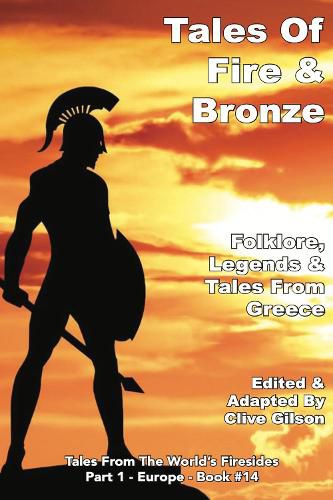Readings Newsletter
Become a Readings Member to make your shopping experience even easier.
Sign in or sign up for free!
You’re not far away from qualifying for FREE standard shipping within Australia
You’ve qualified for FREE standard shipping within Australia
The cart is loading…






This title is printed to order. This book may have been self-published. If so, we cannot guarantee the quality of the content. In the main most books will have gone through the editing process however some may not. We therefore suggest that you be aware of this before ordering this book. If in doubt check either the author or publisher’s details as we are unable to accept any returns unless they are faulty. Please contact us if you have any questions.
Mythology was at the heart of everyday life in Ancient Greece. Greeks regarded mythology as a part of their history, using myth to explain natural phenomena, cultural variations, traditional enmities and friendships. It was a source of pride to be able to trace the descent of one’s leaders from a mythological hero or a god. Few ever doubted that there was truth behind the account of the Trojan War in the Iliad and Odyssey.
Greek myths concern the origin and the nature of the world, the lives and activities of deities, heroes, and mythological creatures, and the origins and significance of the ancient Greeks’ own cult and ritual practices.
The Greek myths were initially propagated in an oral-poetic tradition most likely by Minoan and Mycenaean singers. Eventually the myths of the heroes of the Trojan War and its aftermath became part of the oral tradition of Homer’s epic poems, the Iliad and the Odyssey.
Two poems by Homer’s near contemporary Hesiod, the Theogony and the Works and Days, contain accounts of the genesis of the world, the succession of divine rulers, the succession of human ages, the origin of human woes, and the origin of sacrificial practices.
Myths are also preserved in the Homeric Hymns, in fragments of epic poems of the Epic Cycle, in lyric poems, in the works of the tragedians and comedians of the fifth century BC, in writings of scholars and poets of the Hellenistic Age, and in texts from the time of the Roman Empire by writers such as Plutarch and Pausanias.
The adaptations in this book come from the nineteenth century tradition of translation and interpretation from collectors, notably such as Andrew Lang and Charles Kingsley, amongst many others.
As ever, it’s been a delight and an education to read and work with these stunning texts. I hope you enjoy them too, for as the final line of The Golden Crab says, And then they lived happily, and we who hear the story are happier still.
$9.00 standard shipping within Australia
FREE standard shipping within Australia for orders over $100.00
Express & International shipping calculated at checkout
This title is printed to order. This book may have been self-published. If so, we cannot guarantee the quality of the content. In the main most books will have gone through the editing process however some may not. We therefore suggest that you be aware of this before ordering this book. If in doubt check either the author or publisher’s details as we are unable to accept any returns unless they are faulty. Please contact us if you have any questions.
Mythology was at the heart of everyday life in Ancient Greece. Greeks regarded mythology as a part of their history, using myth to explain natural phenomena, cultural variations, traditional enmities and friendships. It was a source of pride to be able to trace the descent of one’s leaders from a mythological hero or a god. Few ever doubted that there was truth behind the account of the Trojan War in the Iliad and Odyssey.
Greek myths concern the origin and the nature of the world, the lives and activities of deities, heroes, and mythological creatures, and the origins and significance of the ancient Greeks’ own cult and ritual practices.
The Greek myths were initially propagated in an oral-poetic tradition most likely by Minoan and Mycenaean singers. Eventually the myths of the heroes of the Trojan War and its aftermath became part of the oral tradition of Homer’s epic poems, the Iliad and the Odyssey.
Two poems by Homer’s near contemporary Hesiod, the Theogony and the Works and Days, contain accounts of the genesis of the world, the succession of divine rulers, the succession of human ages, the origin of human woes, and the origin of sacrificial practices.
Myths are also preserved in the Homeric Hymns, in fragments of epic poems of the Epic Cycle, in lyric poems, in the works of the tragedians and comedians of the fifth century BC, in writings of scholars and poets of the Hellenistic Age, and in texts from the time of the Roman Empire by writers such as Plutarch and Pausanias.
The adaptations in this book come from the nineteenth century tradition of translation and interpretation from collectors, notably such as Andrew Lang and Charles Kingsley, amongst many others.
As ever, it’s been a delight and an education to read and work with these stunning texts. I hope you enjoy them too, for as the final line of The Golden Crab says, And then they lived happily, and we who hear the story are happier still.